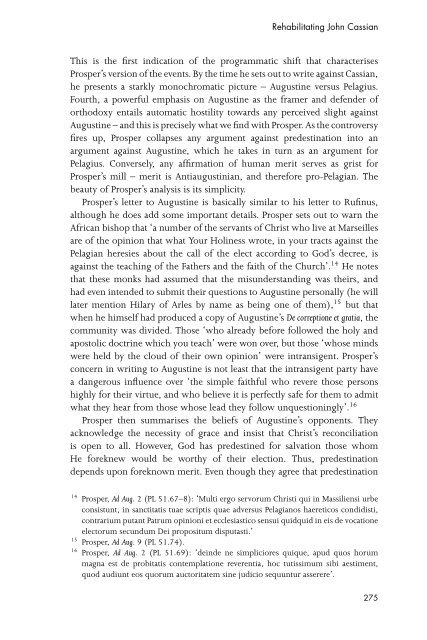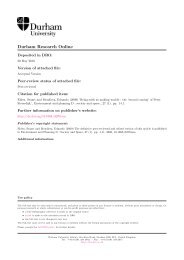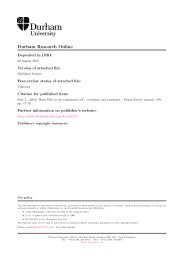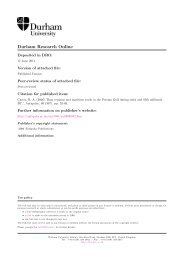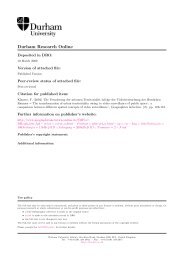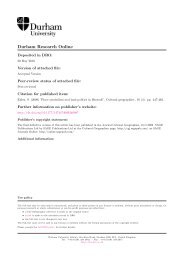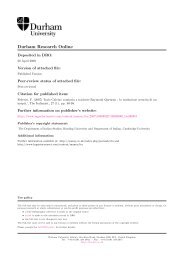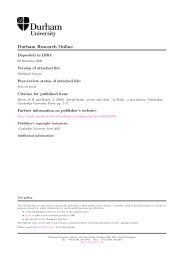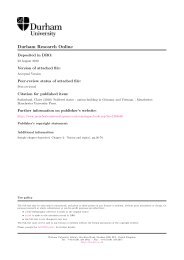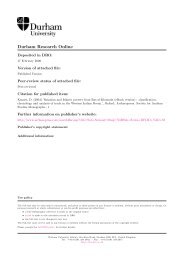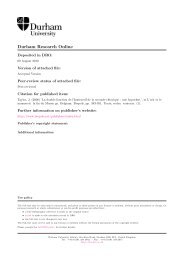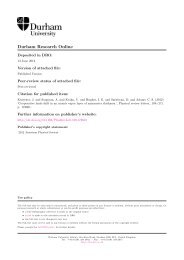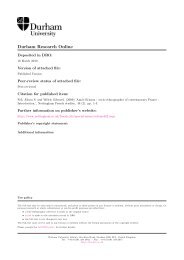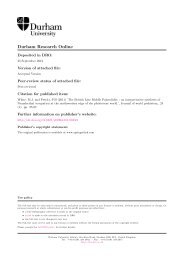Rehabilitating John Cassian: an evaluation of Prosper of Aquitaine's ...
Rehabilitating John Cassian: an evaluation of Prosper of Aquitaine's ...
Rehabilitating John Cassian: an evaluation of Prosper of Aquitaine's ...
You also want an ePaper? Increase the reach of your titles
YUMPU automatically turns print PDFs into web optimized ePapers that Google loves.
<strong>Rehabilitating</strong> <strong>John</strong> <strong>Cassi<strong>an</strong></strong><br />
This is the first indication <strong>of</strong> the programmatic shift that characterises<br />
<strong>Prosper</strong>’s version <strong>of</strong> the events. By the time he sets out to write against <strong>Cassi<strong>an</strong></strong>,<br />
he presents a starkly monochromatic picture – Augustine versus Pelagius.<br />
Fourth, a powerful emphasis on Augustine as the framer <strong>an</strong>d defender <strong>of</strong><br />
orthodoxy entails automatic hostility towards <strong>an</strong>y perceived slight against<br />
Augustine – <strong>an</strong>d this is precisely what we find with <strong>Prosper</strong>. As the controversy<br />
fires up, <strong>Prosper</strong> collapses <strong>an</strong>y argument against predestination into <strong>an</strong><br />
argument against Augustine, which he takes in turn as <strong>an</strong> argument for<br />
Pelagius. Conversely, <strong>an</strong>y affirmation <strong>of</strong> hum<strong>an</strong> merit serves as grist for<br />
<strong>Prosper</strong>’s mill – merit is Antiaugustini<strong>an</strong>, <strong>an</strong>d therefore pro-Pelagi<strong>an</strong>. The<br />
beauty <strong>of</strong> <strong>Prosper</strong>’s <strong>an</strong>alysis is its simplicity.<br />
<strong>Prosper</strong>’s letter to Augustine is basically similar to his letter to Rufinus,<br />
although he does add some import<strong>an</strong>t details. <strong>Prosper</strong> sets out to warn the<br />
Afric<strong>an</strong> bishop that ‘a number <strong>of</strong> the serv<strong>an</strong>ts <strong>of</strong> Christ who live at Marseilles<br />
are <strong>of</strong> the opinion that what Your Holiness wrote, in your tracts against the<br />
Pelagi<strong>an</strong> heresies about the call <strong>of</strong> the elect according to God’s decree, is<br />
against the teaching <strong>of</strong> the Fathers <strong>an</strong>d the faith <strong>of</strong> the Church’. 14 He notes<br />
that these monks had assumed that the misunderst<strong>an</strong>ding was theirs, <strong>an</strong>d<br />
had even intended to submit their questions to Augustine personally (he will<br />
later mention Hilary <strong>of</strong> Arles by name as being one <strong>of</strong> them), 15 but that<br />
when he himself had produced a copy <strong>of</strong> Augustine’s De correptione et gratia,the<br />
community was divided. Those ‘who already before followed the holy <strong>an</strong>d<br />
apostolic doctrine which you teach’ were won over, but those ‘whose minds<br />
were held by the cloud <strong>of</strong> their own opinion’ were intr<strong>an</strong>sigent. <strong>Prosper</strong>’s<br />
concern in writing to Augustine is not least that the intr<strong>an</strong>sigent party have<br />
a d<strong>an</strong>gerous influence over ‘the simple faithful who revere those persons<br />
highly for their virtue, <strong>an</strong>d who believe it is perfectly safe for them to admit<br />
what they hear from those whose lead they follow unquestioningly’. 16<br />
<strong>Prosper</strong> then summarises the beliefs <strong>of</strong> Augustine’s opponents. They<br />
acknowledge the necessity <strong>of</strong> grace <strong>an</strong>d insist that Christ’s reconciliation<br />
is open to all. However, God has predestined for salvation those whom<br />
He foreknew would be worthy <strong>of</strong> their election. Thus, predestination<br />
depends upon foreknown merit. Even though they agree that predestination<br />
14 <strong>Prosper</strong>, Ad Aug. 2 (PL 51.67–8): ‘Multi ergo servorum Christi qui in Massiliensi urbe<br />
consistunt, in s<strong>an</strong>ctitatis tuae scriptis quae adversus Pelagi<strong>an</strong>os haereticos condidisti,<br />
contrarium put<strong>an</strong>t Patrum opinioni et ecclesiastico sensui quidquid in eis de vocatione<br />
electorum secundum Dei propositum disputasti.’<br />
15 <strong>Prosper</strong>, Ad Aug. 9 (PL 51.74).<br />
16 <strong>Prosper</strong>, Ad Aug. 2 (PL 51.69): ‘deinde ne simpliciores quique, apud quos horum<br />
magna est de probitatis contemplatione reverentia, hoc tutissimum sibi aestiment,<br />
quod audiunt eos quorum auctoritatem sine judicio sequuntur asserere’.<br />
275


